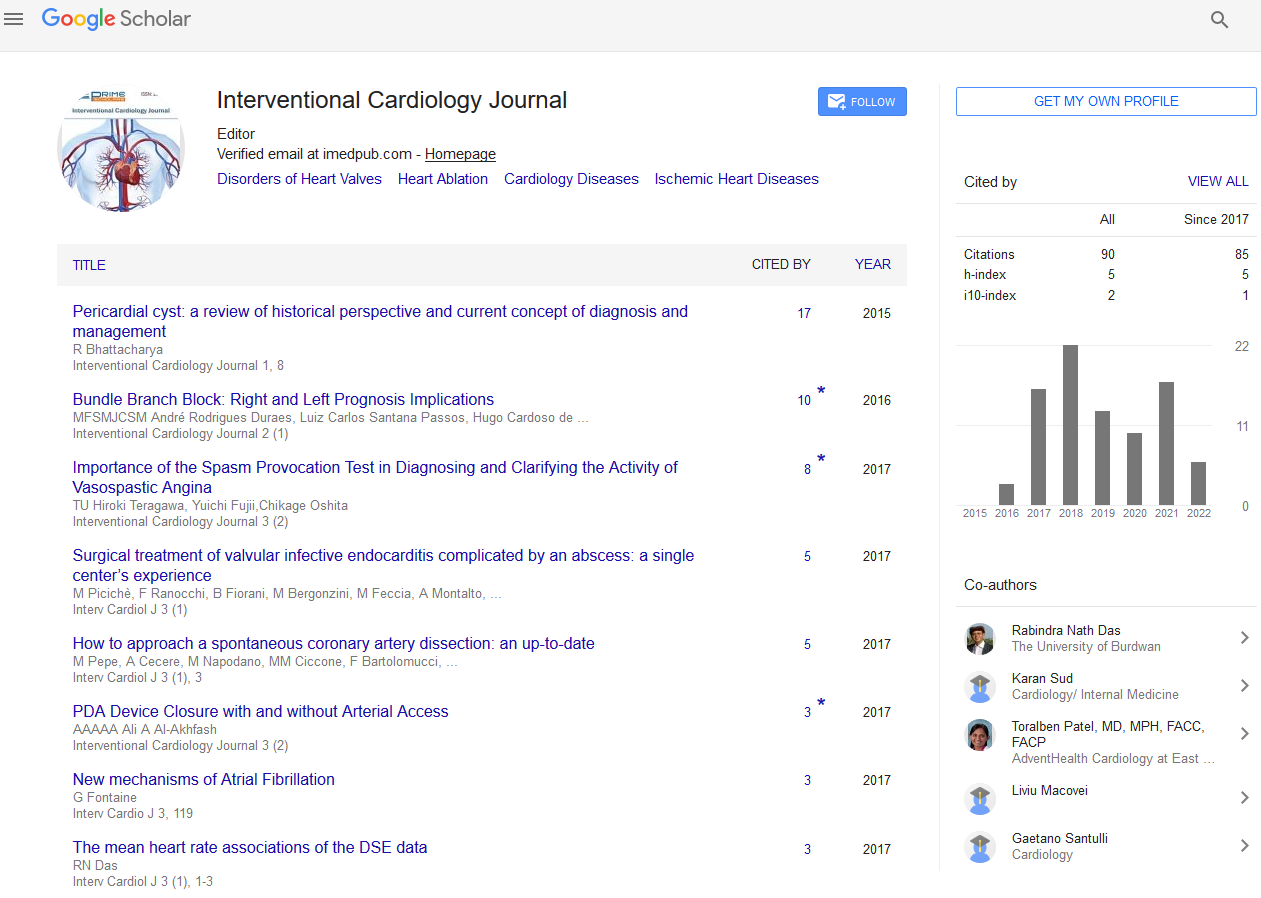Commentary - (2024) Volume 10, Issue 3
Exploring the Depths of Cardiac Anesthesiology: Ensuring Safety and Success in Complex Cardiac Surgeries
Lisa Charles*
Department of Cardiology, Cornell University, USA
*Correspondence:
Lisa Charles,
Department of Cardiology, Cornell University,
USA,
Email:
Received: 28-Feb-2024, Manuscript No. IPIC-23-19344;
Editor assigned: 01-Mar-2024, Pre QC No. IPIC-23-19344 (PQ);
Reviewed: 15-Mar-2024, QC No. IPIC-23-19344;
Revised: 20-Mar-2024, Manuscript No. IPIC-23-19344 (R);
Published:
27-Mar-2024, DOI: 10.21767/2471-8157.10.03.25
Description
Cardiac anesthesia stands at the forefront of perioperative
care for patients undergoing complex cardiac surgeries,
providing critical support to ensure hemodynamic stability,
optimal tissue perfusion, and patient comfort throughout
the procedure. As advancements in surgical techniques
and medical technology continue to expand the scope of
cardiac interventions, the role of the cardiac anesthesiologist
becomes increasingly vital in navigating the intricacies of
these high-risk procedures. Cardiac anesthesia encompasses
the specialized care of patients undergoing a wide range of
cardiac procedures, including Coronary Artery Bypass Grafting
(CABG), valve repair or replacement, congenital heart surgery,
and transcatheter interventions. Unlike general anesthesia for
non-cardiac surgeries, cardiac anesthesia requires a nuanced
understanding of cardiovascular physiology, hemodynamic
monitoring, and advanced pharmacological management to
mitigate the inherent risks associated with cardiac surgery.
One of the primary objectives of cardiac anesthesia is to
maintain cardiovascular stability throughout the perioperative
period, balancing the conflicting goals of anesthesia-induced
vasodilation, myocardial depression, and systemic inflammatory
response with the hemodynamic demands of surgery. Achieving
this delicate equilibrium necessitates meticulous preoperative
assessment, intraoperative monitoring, and tailored anesthetic
management strategies tailored to the individual patient's
cardiac pathology, comorbidities, and surgical requirements.
The preoperative assessment of patients undergoing cardiac
surgery plays a pivotal role in identifying and addressing
potential risk factors, optimizing cardiovascular function,
and minimizing perioperative complications. Comprehensive
preoperative evaluation includes a detailed medical history,
physical examination, and diagnostic tests to assess cardiac
function, pulmonary status, renal function, and coagulation
profile. Special attention is given to optimizing modifiable risk
factors, such as hypertension, diabetes, and coronary artery
disease, through pharmacological management, lifestyle
modifications, and preoperative revascularization strategies.
In patients with significant comorbidities or advanced
age, multidisciplinary collaboration with cardiologists,
cardiothoracic surgeons, and other specialists is essential to
develop individualized care plans that prioritize perioperative
safety and optimize long-term outcomes. During cardiac
surgery, the cardiac anesthesiologist assumes responsibility for
maintaining hemodynamic stability, myocardial protection, and
tissue perfusion while ensuring adequate depth of anesthesia
and analgesia. Continuous hemodynamic monitoring, including
invasive arterial blood pressure monitoring, central venous
pressure monitoring, and Transesophageal Echocardiography
(TEE), provides real-time assessment of cardiac function,
volume status, and tissue oxygenation, guiding therapeutic
interventions and titration of vasoactive medications.
Innovations in perioperative monitoring and technology, such as
minimally invasive cardiac output monitoring devices, point-ofcare
ultrasound, and Enhanced Recovery After Surgery (ERAS)
protocols, offer opportunities to streamline perioperative care,
improve resource utilization, and enhance patient outcomes
in cardiac surgery. Additionally, ongoing research into novel
pharmacological agents, targeted myocardial protection
strategies, and personalized perioperative management
protocols holds promise for further optimizing cardiac
anesthesia and advancing the field of perioperative medicine.
Cardiac anesthesia represents a dynamic and evolving
subspecialty within anesthesiology, dedicated to ensuring the
safety, efficacy, and comfort of patients undergoing complex
cardiac surgeries.
Acknowledgement
None.
Conflict Of Interest
The author’s declared that they have no conflict of interest.
Citation: Charles L (2024) Exploring the Depths of Cardiac Anesthesiology: Ensuring Safety and Success in Complex Cardiac Surgeries. Interv Cardiol J. 10:25.
Copyright: © 2024 Charles L. This is an open-access article distributed under the terms of the Creative Commons Attribution License, which permits unrestricted use, distribution, and reproduction in any medium, provided the original author and source are credited.

